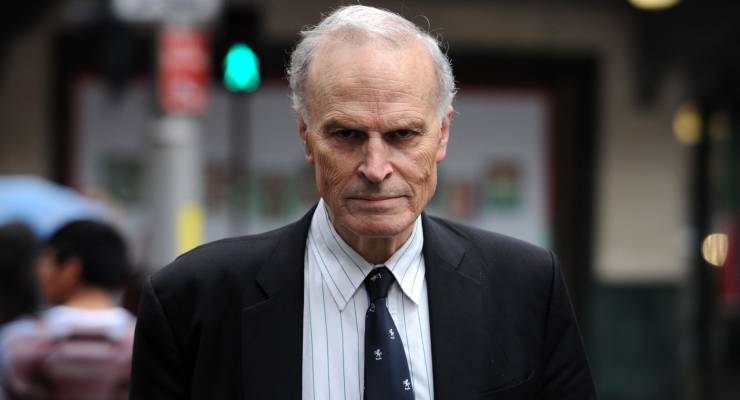
This week, it was revealed that an inquiry found former High Court judge Dyson Heydon sexually harassed six judges’ associates. He denies this.
A statement by his lawyers criticised the inquiry on the grounds that it was conducted by a public servant and not by a lawyer.
Amazing. To anyone but a lawyer, the idea that only a lawyer should investigate misconduct by another lawyer is laughable. Especially when the lawyer concerned had been one of the most senior judges in the country.
If the investigator had been a lawyer he or she would have faced enormous social pressure to overlook or excuse the conduct. Respect for judges is deeply ingrained in legal culture.
The parallel would be asking priests to investigate allegations of sexual misconduct by more senior priests. Surely that would never happen? Could the public trust such investigations?
Hold on — we know the answer. Internal inquiries into sexual abuse by clergy did happen, and failed. It took a royal commission to uncover those stories properly.
So the High Court was entirely right to appoint someone outside the system to conduct the inquiry. Vivienne Thom was not a random public servant. She is a former inspector-general of intelligence and security, a senior and sensitive post. The High Court has accepted her findings and recommendations.
Beyond the immediate story, there are deeper questions about the accountability of the judiciary.
The performance and conduct of judges is to a large extent shielded from outside scrutiny due to the doctrine of separation of powers. People outside the legal system having power to hold judges accountable is anathema to the legal system.
Separation of powers is an idea with long antecedents. It flourished in the 18th century, articulated by French philosopher Montesquieu and seeing full expression in the United States Constitution. It holds that government should be divided into different branches — legislature, executive and judicial (in Australia, parliaments, Ministers and public servants, courts) — so no one branch can dominate.
It is a doctrine designed for good purposes. Nobody would want to see judges being subject to oversight or direction from government ministers. An independent judiciary is one of our few protections against government overreach.
In practice, however, judges (applying their own interpretation of separation of powers) have resisted even minor attempts to introduce external scrutiny.
No High Court judge has ever been removed from office — section 72 of the constitution has never been used. The only Supreme Court judge to have been removed was Angelo Vasta, in Queensland in 1989 following the Fitzgerald corruption inquiry.
Removal is a last resort in cases of egregious misbehavior. At a more mundane level, most lawyers know (but few will tell) that some judges simply do not perform well — slow, inefficient, demanding respect but giving none back, rude or abusive. These failings are not brought to account.
There are positives in our court system. By contrast with the increasingly secretive executive branch, court proceedings are generally public (with some exceptions) and reasons for judgements are published. But transparency for what happens behind the scenes, and accountability for performance, are not its strong suits.
As usual, one of the best commentaries on the situation came from former law reform commission and High Court judge Michael Kirby Almost 20 years ago he observed “the world has changed since the colonial judiciary of the British Empire was established in Commonwealth countries … Today, transparency and accountability are required”.
There are ways to do this that don’t put courts under the thumb of executive government. Arguably there is now a fourth branch of government — integrity bodies. These could help hold the judiciary accountable, in the same way as they help improve accountability of the executive branch.
So for example, as with every other publicly funded institution, courts could be subject to performance auditing by Commonwealth and State auditors-general. Auditors are independent, not part of the executive.
If we had an independent national corruption commission it should include judicial corruption in its remit, as with State anti-corruption bodies.
Or we could have a new independent body, not comprised of lawyers, established to investigate personal misconduct by judges. There is no reason why farmers, pharmacists, school teachers, shopkeepers, people selected from any walk of life, could not be trusted to do this fairly and impartially.
Parliament could have a greater role in judicial appointments, akin to US confirmation hearings. Although political and theatrical, these hearings at least weed out really terrible appointments.
Any changes along these lines would need to be nutted out and agreed with the judiciary. In the face of the Dyson Heydon affair, they might today be more inclined to consider accountability reforms.








Should be no need for judges to judge the judges – external reports like the one Kiefel organized should be enough….one strike and you’re out..!!
Same story with corrupt or violent cops.
The people we entrust to supervise and uphold the law should get very short shrift indeed if they abuse those laws from their positions of power.
Yes, especially when you hear of unskilled and semi-skilled workers getting the sack for one drunken and overly-familiar, but relatively harmless, SMS.
A Commission of Enquiry into Justice Lionel Murphy was abandoned when Murphy became terminally ill. Otherwise, section 72 might have been implemented to remove Murphy.
It is hard to imagine how the tenure of judges might be regulated without exposing them to partisan political pressure. Certainly, if judges are corrupt or engage in criminal behaviour it is appropriate that they be removed.
If we can’t trust our politicians to make appropriate appointments or to make impartial decisions to apply their constitutional powers then perhaps that is a sign that the system is breaking down.